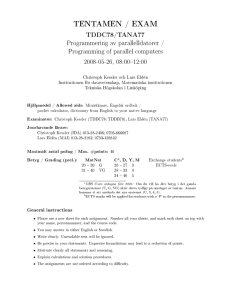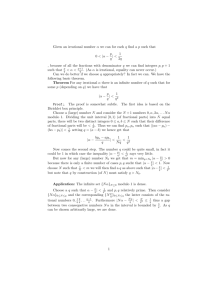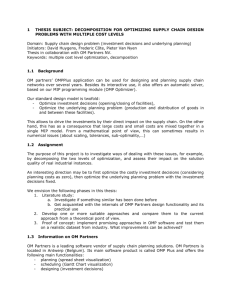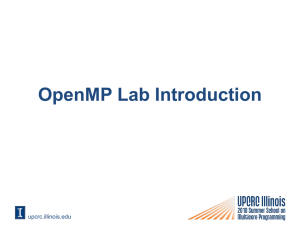Document 13568167
advertisement
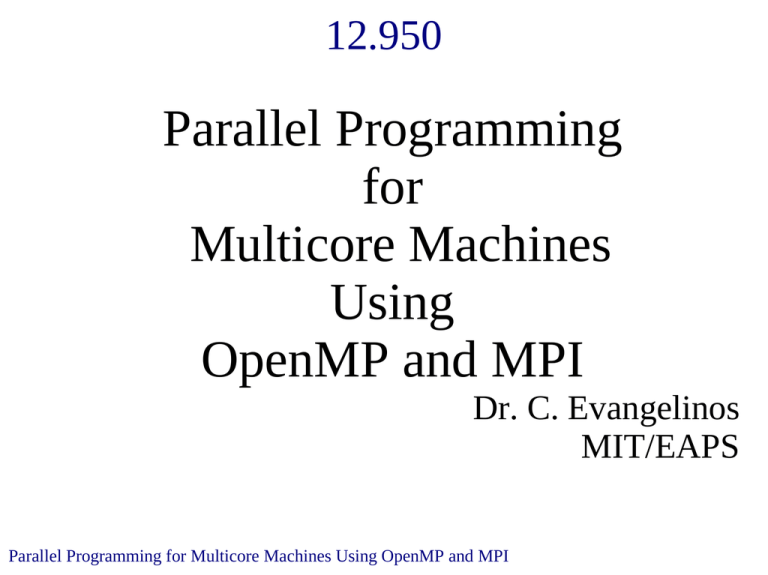
12.950
Parallel Programming
for
Multicore Machines
Using
OpenMP and MPI
Dr. C. Evangelinos
MIT/EAPS
Parallel Programming for Multicore Machines Using OpenMP and MPI
Course basics
●
Web site: http://stellar.mit.edu/S/course/12/ia10/12.950/
●
https://wikis.mit.edu/confluence/display/12DOT950ia10/Home
●
Homeworks: One per day, incremental, finally due Feb 1.
●
Discussion on homework problems during next class
●
Grade: A/B/C etc.
●
Textbook: none! But suggested books on Web site.
●
Look at a lot of other support material on the Web site, including
instructions about virtual machines.
●
Please sign up with your name, Athena e-mail (if existing) and
whether you want to be a listener or not. You can change this
before the end of the course.
Parallel Programming for Multicore Machines Using OpenMP and MPI
StarHPC
●
A VMware Player/VirtualBox image with OpenMPI
and the GNU and Sun compilers for OpenMP for
development alongside Eclipse PTP and SunStudio
12/Netbeans for an IDE. Link to download the virtual
machine will appear on the class website.
●
http://web.mit.edu/star/hpc/ contains detailed
instructions on using the Virtual Machines.
●
E-mail star@mit.edu for support and troubleshooting.
Parallel Programming for Multicore Machines Using OpenMP and MPI
Course Syllabus
●
Day 1 (Parallel Computing and OpenMP):
●
Fundamentals of Shared Memory Programming
●
Basic OpenMP concepts, PARALLEL directive
●
Data scoping rules
●
Basic OpenMP constructs/directives/calls
●
Examples
●
Parallelizing an existing code using OpenMP
●
More advanced OpenMP directives & functions
●
OpenMP Performance issues
Parallel Programming for Multicore Machines Using OpenMP and MPI
Syllabus cont.
●
●
Day 2 (Parallel Computing and MPI Pt2Pt):
●
OpenMP 3.0 enhancements
●
Fundamentals of Distributed Memory Programming
●
MPI concepts
●
Blocking Point to Point Communications
Day 3 (More Pt2Pt & Collective communications):
●
Paired and Nonblocking Point to Point Communications
●
Other Point to Point routines
●
Collective Communications: One-with-All
●
Collective Communications: All-with-All
Parallel Programming for Multicore Machines Using OpenMP and MPI
Syllabus cont.
●
Day 4 (advanced MPI-1):
●
Collective Communications: All-with-All
●
Derived Datatypes
●
Groups, Contexts and Communicators
●
Topologies
●
Language Binding issues
●
The Runtime and Environment Management
●
The MPI profiling interface and tracing
Parallel Programming for Multicore Machines Using OpenMP and MPI
Syllabus cont.
●
Day 5 (more MPI-1 & Parallel Programming):
●
Hybrid MPI+OpenMP programming
●
MPI Performance Tuning & Portable Performance
●
Performance concepts and Scalability
●
Different modes of parallelism
●
Parallelizing an existing code using MPI
●
Using 3rd party libraries or writing your own library
Parallel Programming for Multicore Machines Using OpenMP and MPI
Outline
●
Fundamentals of Shared Memory Programming
●
Basic OpenMP concepts, PARALLEL directive
●
Data scoping rules
●
Basic OpenMP constructs/directives/calls
●
Examples
●
Parallelizing an existing code using OpenMP
●
More advanced OpenMP directives & functions
●
OpenMP Performance and Correctness issues
Parallel Programming for Multicore Machines Using OpenMP and MPI
Acknowledgments
●
The OpenMP ARB
●
Tim Mattson (Intel) & Rudolf Eigenmann (Purdue)
●
Miguel Hermanss (UP Madrid)
●
Ruud van der Pas (Sun Micro)
●
NERSC, LLNL
Parallel Programming for Multicore Machines Using OpenMP and MPI
Shared Memory Programming
●
Under the assumption of a single address space one uses multiple control
streams (threads, processes) to operate on both private and shared data.
●
Shared data: synchronization, communication, work
●
In shared arena/mmaped file (multiple processes)
●
In the heap of the process address space (multiple threads)
Heap
Thread
Private
stack
Process
address
space
Thread
Process
Private
stack
Private
heap
Private
stack
Parallel Programming for Multicore Machines Using OpenMP and MPI
Shared
memory
arena
Single
process
space
Process
Private
heap
Private
stack
OpenMP programming model
●
The OpenMP standard provides an API for shared memory
programming using the fork-join model.
●
Multiple threads within the same address space
●
Code parallelization can be incremental
●
Supports both coarse and fine level parallelization
●
Fortran, C, C++ support
Parallel region
{
{
Master thread
Parallel region
F
J
F
J
O
O
O
O
R
I
R
I
K
N
K
N
Figure by MIT OpenCourseWare.
Parallel Programming for Multicore Machines Using OpenMP and MPI
OpenMP conceptual overview
●
Threads read and write shared variables
●
No need for explicit communications with messages
●
Use synchronization to protect against race conditions
●
Shared variable scope attributes help minimize the
necessary synchronization
●
No sense to try and run in parallel loops with loop-carried
dependencies
●
Threads use their own private variables to do work that does
not need to be globally visible outside the parallel region
●
No support for proper parallel I/O
Parallel Programming for Multicore Machines Using OpenMP and MPI
OpenMP history
●
●
During the early multiprocessor days: vendor specific
●
Early standardization efforts: PCF, ANSI X3H5
●
SGI/Cray merger gave impetus to new efforts
OpenMP: Open Multi Processing
●
ARB (Architecture Review Board):
●
Software/hardware vendors, ISVs & DOE/ASCI
●
Evolving standard: currently common at 3.0, some compilers still
implement just Fortran 1.1, C/C++ 1.0. Most Fortran 2.0 or 2.5
however. Version 3.0 support is becoming more common.
●
JOMP for Java (academic project)
●
OpenMP uses compiler directives & library routines
Parallel Programming for Multicore Machines Using OpenMP and MPI
Directives
●
Directives are additions to the source code that can be ignored by the compiler:
●
Appearing as comments (OpenMP Fortran)
●
Appearing as preprocessor macros (OpenMP C/C++)
●
Hence a serial and a parallel program can share the same source code - the
serial compiler simply overlooks the parallel code additions
●
Addition of a directive does not break the serial code
●
However the wrong directive or combination of directives can give rise
to parallel bugs!
●
Easier code maintenance, more compact code
●
New serial code enhancements outside parallel regions will not break the
parallel program.
Parallel Programming for Multicore Machines Using OpenMP and MPI
OpenMP Library and Environment
●
Aside from directives, OpenMP runtime library:
●
Execution environment routines:
●
Who am I? How many of us are there? How are we
running?
●
Lock routines
●
Timing routines
●
Environment variables are another, easy way to modify the parallel
program's behavior from the command line, before execution.
●
Nested parallelism is allowed
●
A dynamic change in the number of threads is allowed before a
parallel region is entered
Parallel Programming for Multicore Machines Using OpenMP and MPI
Nested and Dynamic Parallelism
●
By default, the original number of forked
threads is used throughout
●
If omp_set_dynamic() is used or
OMP_DYNAMIC is TRUE, this number
can be reset.
●
Nested parallel constructs are run serialized
unless omp_set_nested() is used or
OMP_NESTED is TRUE.
●
Implementations are not required to
implement either: Use functions
omp_get_dynamic/omp_get_nested
Parallel Programming for Multicore Machines Using OpenMP and MPI
Basics of Directives
●
Composed of: sentinel construct [clauses]
●
Fortran fixed form: C$OMP, c$OMP, *$OMP, !$OMP
●
Fortran free form: !$OMP
●
Standard Fortran continuation characters allowed
C$OMP parallel default(none) shared(a,b) private(c,d)
C$OMP& reduction(a,+)
●
C/C++: #pragma omp
●
Preprocessor macros allowed after #pragma omp
●
Continuation accomplished with \
#pragma omp parallel default(none) shared(a,b) \
reduction(a,+)
●
Clause order is immaterial
Parallel Programming for Multicore Machines Using OpenMP and MPI
Conditional Compilation
_OPENMP macro defined by the compiler
●
Conditional compilation of OpenMP library calls
●
Enclose within:
●
#ifdef _OPENMP
/* C/C++ (or Fortran code) calling OpenMP runtime lib */
whoami = omp_get_thread_num() + 1;
#endif
Precede by !$/C$/c$/*$ in Fortran:
●
!$
!$
whoami = omp_get_thread_num() + &
& 1
Fixed form formating rules apply
●
Parallel Programming for Multicore Machines Using OpenMP and MPI
Static and Dynamic Extent
●
Directives apply to the structured block that follows:
●
Structured block:
●
1 point of entry, 1 point of exit
●
Illegal to branch out of block, only exit(), stop allowed
●
For Fortran: next line or marked with an !$OMP END
●
For C/C++: next line or enclosed in {}
●
Lexical scope forms the static extent.
●
Any function/subroutine calls within a block give rise to a dynamic extent that
the directive also applies to.
●
Dynamic extent includes static extent + statements in call tree
●
The called code can contain further OpenMP directives
● A directive in a dynamic but not a static extent is called orphan(ed)
Parallel Programming for Multicore Machines Using OpenMP and MPI
Orphan directives
Static or lexical
extent of parallel
region
C$OMP PARALLEL
call foo(q)
C$OMP END PARALLEL
call foo(q)
call bar
One compilation unit
Dynamic
extent
includes
static
extent
+
Subroutine foo(a)
real b, c
Orphan
directive
b = 1.0
C$OMP DO PRIVATE(b,c)
DO i=1,1000
c = log(real(i)+b)
b = c
a = c
ENDDO
return
end
Different compilation unit
Parallel Programming for Multicore Machines Using OpenMP and MPI
Parallel Directive
Most basic of all directives, it implies the creation of a
team of extra threads to execute the structured block:
!$OMP PARALLEL [clauses]
!some Fortran structured block
!$OMP END PARALLEL
#pragma omp parallel [clauses]
{
/* some C/C++ structured block */
}
Structured block:
●Implicit barrier at the end
●Whole block executed in parallel
●Master thread forks slaves, and
participates in parallel computation
●At the end of the region, slaves go
to sleep, spin or are destroyed
●
Parallel Programming for Multicore Machines Using OpenMP and MPI
Parallel Directive Example
PROGRAM PARALLEL
IMPLICIT NONE
Look at hello_omp.f90
!$OMP PARALLEL
write (6,*) "hello world!"
!$OMP END PARALLEL END PROGRAM PARALLEL To run on a system:
% setenv OMP_NUM_THREADS 4
% sunf90 -xopenmp hello_omp.f90
%./a.out
hello world!
hello world!
hello world!
hello world!
Parallel Programming for Multicore Machines Using OpenMP and MPI
Parallel Directive Clauses
●
Control clauses:
●
IF (scalar_logical_expression)
●
●
●
Conditional parallel execution (is there enough work to do?)
NUMTHREADS(scalar_logical_expression)
●
Hardcodes the number of threads (useful for sections)
●
Overrides runtime library call, environment variable
Data sharing attribute clauses (lowercase for C/C++)
●
PRIVATE (list), SHARED (list)
●
DEFAULT (PRIVATE | SHARED | NONE)
●
FIRSTPRIVATE (list)
●
REDUCTION (operator: list)
●
COPYIN (list)
Parallel Programming for Multicore Machines Using OpenMP and MPI
Program ompif
Example of IF clause
integer N
read (5,*) N
Look at ompif.f90
!$OMP PARALLEL IF(N > 1000)
write(6,*) "Here I am running"
!$OMP END PARALLEL
END
To run with 3 threads:
% setenv OMP_NUM_THREADS 3
% ./a.out
5
Here I am running
To run with 9 threads:
% setenv OMP_NUM_THREADS 9
%./a.out
5
Here I am running
% ./a.out
1000000
Here I am running
Here I am running
Here I am running
Here I am running
Here I am running
Here I am running
Here I am running
Here I am running
Here I am running
% ./a.out
1000000
Here I am running
Here I am running
Here I am running
Parallel
Programming for Multicore Machines Using OpenMP and MPI
Default Data Sharing Attributes
●
Threads share global variables
● Fortran: COMMON blocks, SAVE variables, MODULE
variables
C: File scope variables, static, storage on the heap
Stack (automatic) variables are private:
● Automatic variables in a structured block
●
●
●
Local variables in subroutines called from parallel
●
Local pointers pointing to heap storage
●
Loop index variables are by default private
●
Defaults can be changed with the DEFAULT clause
●
Default cannot be private in C/C++
Parallel Programming for Multicore Machines Using OpenMP and MPI
DEFAULT example
iwork = 1000
common /stuff/ a(iwork)
C$OMP PARALLEL PRIVATE(np, ieach)
np = omp_get_num_threads()
ieach = iwork/np
call foo(ieach, iwork, np)
C$OMP END PARALLEL
subroutine foo(ido, iwork, np)
integer ido, iwork, np
common /input/ A(iwork)
real temp(ido)
DO i = 1, ido
temp(i) = A((np-1)*ido+i)
write(6,*) temp(i)
ENDDO iwork = 1000
common /stuff/ a(iwork)
C$OMP PARALLEL DEFAULT(PRIVATE) SHARED(a, iwork)
np = omp_get_num_threads() ieach = iwork/np
call foo(ieach, iwork, np)
C$OMP END PARALLEL
DEFAULT(NONE) serves as a way of forcing the user to
specify the data attribute for each variable to avoid bugs.
Parallel Programming for Multicore Machines Using OpenMP and MPI
PRIVATE clause
●
A private variable is uninitialized upon entry to the parallel region
●
There is no storage association with the variable outside the region
●
However at the end of the parallel region the outside variable's
value cannot be defined on the basis of its prior to the parallel
region value.
●
The example to the right contains
many problems:
●
The value of A is uninitialized
●
The value of A is undefined
Look at problem-private.f
program problem
real A
A = 10.0
C$OMP PARALLEL PRIVATE(A)
A = A + LOG(A)
C$OMP END PARALLEL
print *, A
end
Parallel Programming for Multicore Machines Using OpenMP and MPI
FIRSTPRIVATE clause
●
FIRSTPRIVATE is a variation on PRIVATE with the value
of the variable on each thread initialized by the value of the
variable outside the parallel region
Look at problem-firstprivate.f
program problem
real A
A = 10.0
C$OMP PARALLEL FIRSTPRIVATE(A)
A = A + LOG(A)
C$OMP END PARALLEL
print *, A
end
●
This solves one of the two
problems seen before but the
final value is still undefined,
could be 10.0
●
This can be corrected in the case of DO/for or SECTION
worksharing constructs through use of the LASTPRIVATE
clause and for SINGLE through the COPYPRIVATE clause
Parallel Programming for Multicore Machines Using OpenMP and MPI
REDUCTION clause
●
It enables reduction binary operations (arithmetic, logical and intrinsic
procedures like MAX) in an optimal manner (as they require atomic updates).
●
Scalar variables are initialized to relevant values and at the end of the loop the
value of the variable before the parallel execution is also included in the
reduction.
!$OMP PARALLEL DEFAULT(PRIVATE) REDUCTION(+:I) &
!$ & REDUCTION(*:J) REDUCTION(MAX:K)
tnumber=OMP_GET_THREAD_NUM()
I = I + tnumber
J = J * tnumber
Look at reduction.f90
K = MAX(K,tnumber)
!$OMP END PARALLEL
PRINT *, " I=",I," J=", J," K=",K
Parallel Programming for Multicore Machines Using OpenMP and MPI
Worksharing constructs
●
Worksharing constructs allow us to distribute
different work to threads in a parallel region:
Iterative worksharing:
!$OMP DO
DO i=1,N
! some fortran work
ENDDO
!$OMP END DO
!$OMP WORKSHARE
FORALL (i=1,N)
! some Fortran 90/95 work
!$OMP END WORKSHARE
Non-iterative worksharing:
!$OMP SECTIONS
!$OMP SECTION
! some fortran work
!$OMP SECTION
! some other fortran work
!$OMP END SECTIONS
Serial work by any processor:
!$OMP SINGLE
!some serial work
!$OMP END SINGLE
Iterative worksharing:
#pragma omp for
for (i=0; i<N; i++) {
/* some C/C++ work */
}
Non-iterative worksharing:
#pragma omp sections
{
#pragma omp section
{
/* some C/C++ work */
}
#pragma omp section
{
/* some other C/C++ work */
}
}
Serial work by any processor:
#pragma omp single
{
/* some serial work */
}
Parallel Programming for Multicore Machines Using OpenMP and MPI
DO/for construct
C$OMP PARALLEL PRIVATE(mytid,many,ntill,i)
mytid = omp_get_thread_num()
many = N/omp_get_num_threads()
ntill = (mytid+1)*many -1
C$OMP PARALLEL
C$OMP DO
do i=1,N
write(6,*) foo
enddo
C$OMP END DO
C$OMP END PARALLEL
do i=mytid*many, ntill write(6,*) foo
enddo
C$OMP END PARALLEL
C/C++ for loops need to be
in canonical shape:
initialization
comparison test (order)
increment of loop index
loop limits are invariant
increment is invariant
Figure by MIT OpenCourseWare.
Parallel Programming for Multicore Machines Using OpenMP and MPI
DO/for clauses
●
The DO/for construct has the following clauses:
●
●
Data scope attribute clauses (lowercase for C/C++)
●
PRIVATE (list), SHARED (list)
●
FIRSTPRIVATE (list), LASTPRIVATE (list)
●
REDUCTION (operator: list)
●
COPYIN (list)
Execution control clauses
●
SCHEDULE (type, chunk)
●
ORDERED
●
NOWAIT (at the !$OMP END DO for Fortran)
Parallel Programming for Multicore Machines Using OpenMP and MPI
WORKSHARE construct
●
Added in OpenMP 2.0 to cover F90/F95
●
Works on array notation operations, forall & where statements
& constructs and transformational array intrinsics like
matmul, dot_product, cshift etc.
●
Can only include ATOMIC and CRITICAL directives
●
Private variables cannot be modified inside the block
●
Applies only to lexical scope
●
No function/subroutine calls inside the block
●
There is an implicit barrier
after every array statement
!$OMP WORKSHARE
A = B + 1.0
FORALL (i=1:100:2) B = A-1.5
WHERE (A .NE. 1.5) A = B
!$OMP END WORKSHARE NOWAIT
Parallel Programming for Multicore Machines Using OpenMP and MPI
SECTIONS & SINGLE constructs
C$OMP PARALLEL
C$OMP SECTIONS
call foo
C$OMP SECTION
call bar
C$OMP END PARALLEL
C$OMP PARALLEL PRIVATE(mytid)
mytid = omp_get_thread_num()
if (mytid .eq. 0) then
call foo
endif
if (mytid .eq. 1) then
call bar
endif
C$OMP END PARALLEL
Figures by MIT OpenCourseWare.
The SINGLE construct allows code
that is serial in nature to be executed
inside a parallel region. The thread executing the code will be the
first to reach the directive in the code. It doesn't have to be the
master thread. All other threads proceed to the end of the
structured block where there is an implicit synchronization.
Parallel Programming for Multicore Machines Using OpenMP and MPI
SECTION & SINGLE clauses
●
The SECTION construct has the following clauses:
●
●
●
Data scope attribute clauses (lowercase for C/C++)
●
PRIVATE (list), FIRSTPRIVATE (list), LASTPRIVATE (list)
●
REDUCTION (operator: list)
●
COPYIN (list)
NOWAIT (at the !$OMP END SECTION for Fortran)
The SINGLE construct has the following clauses:
●
Data scope attribute clauses (lowercase for C/C++)
●
PRIVATE (list), FIRSTPRIVATE (list)
●
NOWAIT (at the !$OMP END SINGLE for Fortran)
●
COPYPRIVATE(list) (at the !$OMP END SINGLE for Fortran, cannot
coexist with NOWAIT)
Parallel Programming for Multicore Machines Using OpenMP and MPI
MASTER
●
Only the master thread executes the section
●
●
●
The rest of the threads proceed to continue execution from
the end of the master section
There is no barrier at the end of the master section
Same as SINGLE NOWAIT but only for master thread
C$OMP PARALLEL
#pragma omp parallel
..
{
C$OMP MASTER
..
print*, "Init"
#pragma omp master
C$OMP END MASTER
printf("Init\n");
..
..
C$OMP END PARALLEL
}
Not really a synchronization construct!
Parallel Programming for Multicore Machines Using OpenMP and MPI
Use of NOWAIT
!$OMP DO ●
●
●
Implicit synchronizations at the
end of worksharing constructs,
even in the absence of an !
$OMP END directive.
Sometimes unnecessary - user
can specify no synchronization
using NOWAIT judiciously.
Similar care needs to be taken
when using shared variables
inside a loop on both RHS &
LHS.
DO i=1, N
A(i) = log(B(i))
ENDDO
!$OMP END DO NOWAIT
!$OMP DO
DO i=1, M
C(i) = EXP(D(i))
ENDDO
!$OMP END DO NOWAIT
!$OMP DO
DO i=1, M
D(i) = C(i)/D(i)
ENDDO
!$OMP END DO
$!OMP DO
DO i=1, N
B(i) = 1.0*i+ 0.5
A(i) = A(i)*B(i)
ENDDO
$!OMP END DO
Parallel Programming for Multicore Machines Using OpenMP and MPI
LASTPRIVATE clause
●
LASTPRIVATE(variable) will make sure that what
would have been the last value of the private variable
if the loop had been executed sequentially gets
assigned to the variable outside the scope
●
Look at the sequence of problem-*.f files in the homework.
C$OMP
C$OMP
C$OMP
C$OMP
program problem
real A(4)
DO I=1,4
A(I) = 10.0
ENDDO
PARALLEL FIRSTPRIVATE(A)
DO LASTPRIVATE(A)
DO I=1,4
A(I) = A(I) + LOG(A(I))
ENDDO
END DO
print *, "region result is ", A
END PARALLEL
print *, "result is ", A
end
program problem
real A(4)
DO I=1,4
A(I) = 10.0
ENDDO
C$OMP PARALLEL DO FIRSTPRIVATE(A) C$ &LASTPRIVATE(A)
DO I=1,4
A(I) = A(I) + LOG(A(I))
ENDDO
C$OMP END PARALLEL DO
print *, "result is ", A
end
Parallel Programming for Multicore Machines Using OpenMP and MPI
Combined Worksharing Directives
●
For convenience combinations of PARALLEL with
DO/for, SECTIONS and WORKSHARE are allowed,
with reasonable combinations of allowed clauses
●
NOWAIT does not make sense in this case
●
!$OMP PARALLEL DO
●
#pragma omp parallel for
●
!$OMP PARALLEL SECTIONS
●
#pragma omp parallel sections
●
!$OMP PARALLEL WORKSHARE
Parallel Programming for Multicore Machines Using OpenMP and MPI
Allowed Combinations
Clause
PARALLEL DO/fo SECTIONSSINGLE WORKSHAR PARALLEL PARALLEL PARALLEL
r
E
DO/for
SECTIONS WORKSHARE
IF
OK
OK
OK
OK
PRIVATE
OK
OK
OK
OK
OK
OK
OK
SHARED
OK
OK
OK
OK
OK
DEFAULT
OK
OK
OK
OK
FIRSTPRIVATE
OK
OK
OK
OK
OK
OK
OK
LASTPRIVATE
OK
OK
OK
OK
REDUCTION
OK
OK
OK
OK
OK
OK
COPYIN
OK
OK
OK
OK
SCHEDULE
OK
OK
ORDERED
OK
OK
NOWAIT
OK
OK
OK
OK
Parallel Programming for Multicore Machines Using OpenMP and MPI
Synchronization
●
Explicit synchronization is sometimes necessary in OpenMP programs.
There's several constructs & directives handling it:
● CRITICAL: Mutual Exclusion
●
●
!$OMP CRITICAL [name]/!$OMP END CRITICAL [name]
●
#pragma omp critical [name]
ATOMIC: Atomic Update
●
●
BARRIER: Barrier Synchronization
●
●
!$OMP ATOMIC, #pragma omp atomic
!$OMP BARRIER, #pragma omp barrier
MASTER: Master Section
●
!$OMP MASTER/!$OMP END MASTER
●
#pragma omp master
Parallel Programming for Multicore Machines Using OpenMP and MPI
BARRIER
●
●
●
●
●
Barrier Synchronization
Threads wait until all threads reach this point
Implicit barrier at the end of each parallel region
Costly operation, to be used judiciously
Be careful not to cause deadlock:
● No barrier inside of CRITICAL, MASTER, SECTIONS, SINGLE!
C$OMP PARALLEL
..
C$OMP BARRIER
..
C$OMP END PARALLEL
#pragma omp parallel {
..
#pragma omp barrier
..
}
Parallel Programming for Multicore Machines Using OpenMP and MPI
●
CRITICAL
Can be named (strongly suggested)
●
these names have a global scope and must not conflict with
subroutine or common block names
●
They ensure that only one thread at a time is in the critical section.
The rest wait at the beginning of the section, or proceed after
finishing their work.
●
Essentially serializes work - beware of the drop in performance
and use when necessary!
C$OMP PARALLEL
..
C$OMP CRITICAL(mult)
A(i) = A(i) * vlocal
C$OMP END CRITICAL(mult)
..
C$OMP END PARALLEL
#pragma omp parallel {
..
#pragma omp critical(mult)
A(i) *= vlocal
..
}
Parallel Programming for Multicore Machines Using OpenMP and MPI
ATOMIC
●
Optimization of mutual exclusion for atomic updates
●
●
Not structured, applies to immediately following statement
At the heart of reduction operations (look at density.f90)
!$OMP ATOMIC
GRID_MASS(BIN(I)) = GRID_MASS(BIN(I)) + PARTICLE_MASS(I)
!$OMP ATOMIC
GRID_N(BIN(I)) = GRID_N(BIN(I)) + 1
●
Enables fast implementation on some HW
●
In all other cases critical sections are actually used
C$OMP PARALLEL
..
C$OMP ATOMIC
A(i) = A(i) - vlocal
..
C$OMP END PARALLEL
#pragma omp parallel {
..
#pragma omp atomic
A(i) -= vlocal
..
}
Parallel Programming for Multicore Machines Using OpenMP and MPI
Synchronization Examples
●
A case combining MASTER, CRITICAL and
BARRIER. (look at barrier.f90)
!$OMP PARALLEL SHARED(L) PRIVATE(nthreads,tnumber)
nthreads = OMP_GET_NUM_THREADS()
tnumber
= OMP_GET_THREAD_NUM()
!$OMP MASTER
PRINT *, ' Enter a value for L'
READ(5,*)
L
!$OMP END MASTER
!$OMP BARRIER
!$OMP CRITICAL
PRINT *, ' My thread number
=',tnumber
PRINT *, ' Value of L
=',L
!$OMP END CRITICAL
!$OMP END PARALLEL
Parallel Programming for Multicore Machines Using OpenMP and MPI
use of CRITICAL
●
Look at the following piece of code.
●
The correct result should be 10+ number of threads.
●
Without a critical directive it has a problem in that updates to
L are not controlled and a race condition develops.
●
If you try to fix things by using an atomic directive to control
the actual update to L inside the function, the reading of the
inout argument is still not controlled.
●
To correct the problem place the subroutine call inside a
critical section.
●
Look at critical.f90, critical-atomic.f90 and critical-fixed.f90
Parallel Programming for Multicore Machines Using OpenMP and MPI
Critical trouble
PROGRAM CRITICAL
SUBROUTINE ADD_ONE(I)
INTEGER:: L,I
IMPLICIT NONE
INTEGER:: nthreads, OMP_GET_NUM_THREADS
INTEGER, INTENT(INOUT):: I
L=10
INTEGER:: J
!$OMP PARALLEL SHARED(L) PRIVATE(nthreads,I)
J=I
!$OMP MASTER
!$OMP MASTER
nthreads = OMP_GET_NUM_THREADS()
OPEN(UNIT=26,FORM='FORMATTED',FILE='junk')
PRINT *, "Number of threads:",nthreads
DO I=1,40000
WRITE(26,*) "Hi Mom!"
!$OMP END MASTER
!$OMP CRITICAL(adder)
CALL ADD_ONE(L)
!$OMP END CRITICAL(adder)
!$OMP END PARALLEL
PRINT *, "The final value of L is", L
END PROGRAM CRITICAL
END DO
CLOSE(26)
!$OMP END MASTER
J=J+1
I=J
END SUBROUTINE ADD_ONE
Parallel Programming for Multicore Machines Using OpenMP and MPI
OpenMP Runtime
●
●
Library calls:
●
omp_set_num_threads, omp_get_num_threads
●
omp_get_max_threads, omp_get_num_procs
●
omp_get_thread_num
●
omp_set_dynamic, omp_get_dynamic
●
omp_set_nested, omp_get_nested
●
omp_in_parallel
Environment variables:
●
OMP_NUM_THREADS (see NUM_THREADS clause)
●
OMP_DYNAMIC
●
OMP_NESTED
Parallel Programming for Multicore Machines Using OpenMP and MPI
Example Programs
●
Solution of Helmholtz eqn via Jacobi iterations (look at file jacobi.f)
●
●
Four parallel loops:
●
One for initialization
●
One for copying the previous state
●
One for evaluating the pointwise residual, updating the solution and
computing the RMS residual
●
One for evaluating the error
Molecular dynamics calculation (look at file md.f)
●
Two parallel loops:
●
Force and energy calculations for every particle pair
Two subroutine/function calls in the lexical extent
Time update of positions, velocities and accelerations
●
●
Parallel Programming for Multicore Machines Using OpenMP and MPI
Jacobi initialization
!$omp parallel do private(xx,yy)
do j = 1,m
do i = 1,n
xx = -1.0 + dx * dble(i-1)
! -1 < x < 1
yy = -1.0 + dy * dble(j-1)
! -1 < y < 1
u(i,j) = 0.0
f(i,j) = -alpha *(1.0-xx*xx)*(1.0-yy*yy)
&
- 2.0*(1.0-xx*xx)-2.0*(1.0-yy*yy)
enddo
enddo
!$omp end parallel do
Parallel Programming for Multicore Machines Using OpenMP and MPI
Jacobi main loop
!$omp do private(resid) reduction(+:error)
do j = 2,m-1
do i = 2,n-1
* Evaluate residual
resid = (ax*(uold(i-1,j) + uold(i+1,j))
&
+ ay*(uold(i,j-1) + uold(i,j+1))
&
+ b * uold(i,j) - f(i,j))/b
* Update solution
u(i,j) = uold(i,j) - omega * resid
* Accumulate residual error
error = error + resid*resid
end do
enddo
!$omp enddo nowait
Parallel Programming for Multicore Machines Using OpenMP and MPI
Jacobi error
!$omp parallel do private(xx,yy,temp) reduction(+:error)
do j = 1,m
do i = 1,n
xx = -1.0d0 + dx * dble(i-1)
yy = -1.0d0 + dy * dble(j-1)
temp = u(i,j) - (1.0-xx*xx)*(1.0-yy*yy)
error = error + temp*temp
enddo
enddo
!$omp end parallel do
error = sqrt(error)/dble(n*m)
Parallel Programming for Multicore Machines Using OpenMP and MPI
MD force and energy calculation
!$omp parallel do
!$omp& default(shared)
!$omp& private(i,j,k,rij,d)
!$omp& reduction(+ : pot, kin)
do i=1,np
! compute potential energy
! and forces
f(1:nd,i) = 0.0
do j=1,np
if (i .ne. j) then
call dist(nd,box, &
& pos(1,i),pos(1,j),rij,d)
! attribute half of the potential
! energy to particle 'j'
pot = pot + 0.5*v(d)
do k=1,nd
f(k,i) = f(k,i) - &
&
rij(k)*dv(d)/d
enddo
endif
enddo
! compute kinetic energy
kin = kin + &
& dotr8(nd,vel(1,i),vel(1,i))
enddo
!$omp end parallel do
kin = kin*0.5*mass
Parallel Programming for Multicore Machines Using OpenMP and MPI
MD pos/vel/acc integration
!$omp parallel do
!$omp& default(shared)
!$omp& private(i,j)
do i = 1,np
do j = 1,nd
pos(j,i) = pos(j,i) + vel(j,i)*dt + 0.5*dt*dt*a(j,i)
vel(j,i) = vel(j,i) + 0.5*dt*(f(j,i)*rmass + a(j,i))
a(j,i) = f(j,i)*rmass
enddo
enddo
!$omp end parallel do
Parallel Programming for Multicore Machines Using OpenMP and MPI
Parallelizing an existing application
●
The really nice feature of OpenMP is that it allows for
incremental parallelization of a code. You can start
from the most expensive (time-wise) routine and work
your way down to less important subroutines with a
valid parallel program at any stage in the process.
●
A few basic steps when starting from scratch:
1)Get a baseline result (some form of output) that you consider
“correct” from your default set of compiler optimization flags.
2)Test for better performance using more aggressive compiler
flags testing for correctness to within some tolerance. Set a new
baseline result based on your final set of flags.
Parallel Programming for Multicore Machines Using OpenMP and MPI
Preparing for parallelization
3)Profile your code: use the -p/-pg flags and prof/gprof or some
of the more capable tools such as Sun Studio's Performance
Analyzer. Locate the most costly parts of your code.
4)At this point you can opt for either a potentially better
performing and scaling “top-level” whole program
parallelization that tries to address more coarse grained parallel
work or go for the easier solution of the incremental loop level
parallelization.
5)If you choose the former you need to study the algorithm and
try and understand where it offers opportunities for data
parallelism.
6)For the latter do the same analysis at the “hottest” loop level.
Parallel Programming for Multicore Machines Using OpenMP and MPI
Parallelizing
8) One can try and use the diagnostic information that the
autoparallelizing engines of most compilers emit to aid in faster
identifying the low hanging fruit for the fine level loop
parallelization.
9) Once you have a functional parallel program test first for
correctness vs. the baseline solution and then for speed and scaling
at various processor counts. Debug if necessary.
10)You then proceed to optimize the code by hoisting and fusing
parallel regions so as to get as few as possible, ideally only one for
the whole code through the use of SINGLE & MASTER. Move
code to subroutines with orphaned directives and privatize as
many variables as possible. Iterate with (9).
Parallel Programming for Multicore Machines Using OpenMP and MPI
THREADPRIVATE & friends
●
$OMP THREADPRIVATE(list)
●
#pragma omp threadprivate(list)
●
Makes global data private to a thread
Fortran: COMMON blocks, module or save variables
● C: File scope and static variables
Different from making them PRIVATE
● with PRIVATE global scope is lost
● THREADPRIVATE preserves global scope within each thread
Threadprivate variables can be initialized using COPYIN
After a SINGLE construct the value of a threadprivate or private
variable can be broadcast to all threads using the COPYPRIVATE
clause.
●
●
●
●
Parallel Programming for Multicore Machines Using OpenMP and MPI
THREADPRIVATE example
integer iam, nthr
subroutine DO_PARALLEL_WORK
real rnumber
integer i, iam, nthr
common /identify/ iam, nthr
real rnumber
common /work/ rnumber
common /identify/ iam, nthr
!$OMP THREADPRIVATE(/identify/ &
common /work/ rnumber
!$OMP& , /work/)
!$OMP THREADPRIVATE(/identify/ &
!$OMP PARALLEL
!$OMP& , /work/)
!$ iam = omp_get_thread_num()
!$OMP DO
!$ nthr = omp_get_num_threads()
DO i=1,nthr
!$OMP END PARALLEL
print *, rnumber, iam
CALL DO_SERIAL_WORK
ENDDO
!OMP PARALLEL COPYIN(work)
!$OMP END DO
print *, iam, nthr, rnumber
end
call DO_PARALLEL_WORK
!OMP END PARALLEL
Look at threadprivate.f90
Parallel Programming for Multicore Machines Using OpenMP and MPI
THREADPRIVATE flow
serial region
thread 0
parallel reg. 1
thread 0
thread 1
thread M
c=o
c=1
c=M
serial region
thread 0
parallel reg. 2
thread 0
thread 1
thread M
c=o
c=1
c=M
serial region
Shared memory
c=?
Shared memory
Shared memory
c=o
Shared memory
Shared memory
thread 0
a=o
COPYING
parallel reg. 3
thread 0
thread 1
thread M
c=o
c=o
c=o
Shared memory
Parallel Programming for Multicore Machines Using OpenMP and MPI
Figure by MIT OpenCourseWare.
SCHEDULE
●
The user has finer control over the distribution of loop iterations onto threads
in the DO/for construct:
●
SCHEDULE(static[,chunk])
●
●
SCHEDULE(dynamic[,chunk])
●
●
Distribute work on available threads in chunk sizes.
SCHEDULE(guided[,chunk])
●
●
Distribute work evenly or in chunk size units
Variation of dynamic starting from large chunks and exponentially
going down to chunk size.
SCHEDULE(runtime)
●
The environment variable OMP_SCHEDULE which is one of
static,dynamic, guided or an appropriate pair, say "static,500"
Parallel Programming for Multicore Machines Using OpenMP and MPI
STATIC
0
0
0
0
0
50
100
150
1
200
250
2
1
1
1
chunk = 150
2
chunk = 250
350
400
2
0
300
I
t
e
r
a
t
i
o
n
S
p
450 a
500 c
e
550
600
chunk = 300
default
Figure by MIT OpenCourseWare.
Parallel Programming for Multicore Machines Using OpenMP and MPI
DYNAMIC
thread 0
thread 1
thread 2
1
2
3
4
5
6
8
Exceution
7
Parallel region
9
10
11
1
2
3
4
5
6
7
12
8
9
10
11
12
Pieces of work
Figure by MIT OpenCourseWare.
Parallel Programming for Multicore Machines Using OpenMP and MPI
GUIDED
2048 iter.
1024 iter.
512 iter.
256 iter.
12
11
10
9
8
7
6
5
4
3
256 iter.
2
1
Pieces of work
Figure by MIT OpenCourseWare.
Parallel Programming for Multicore Machines Using OpenMP and MPI
ORDERED clause
●
Enforces sequential order in a part of a parallel loop:
●
Requires the ordered clause to the DO/for construct
●
No more than one ordered directive can be executed
per iteration
!$OMP PARALLEL DEFAULT(SHARED) &
!$OMP& PRIVATE(I,J)
!$OMP DO SCHEDULE(DYNAMIC,4) &
!$OMP& ORDERED
DO I=1,N
DO J=1,M
Z(I) = Z(I) + X(I,J)*Y(J,I)
END DO
!$OMP ORDERED
IF(I<21) THEN
PRINT *, 'Z(',I,') =',Z(I)
END IF
!$OMP END ORDERED
END DO
!$OMP END DO
!$OMP END PARALLEL
Look at ordered.f90
Parallel Programming for Multicore Machines Using OpenMP and MPI
FLUSH directive
●
At the heart of BARRIER, it enforces a consistent
view of memory.
●
!$OMP FLUSH [(list)]
●
#pragma omp flush [(list)]
●
Restrictions on the use of flush in C/C++, same
restrictions applying to barrier.
if (x != 0)
#pragma omp flush
if (x != 0)
{
#pragma omp flash
}
Parallel Programming for Multicore Machines Using OpenMP and MPI
lock API
●
omp_init_lock, omp_destroy_lock
●
omp_set_lock, omp_unset_lock, omp_test_lock
●
omp_init_nest_lock, omp_destroy_nest_lock
●
omp_set_nest_lock, omp_unset_nest_lock,
omp_test_nest_lock
timing API
●
omp_get_wtime
●
omp_get_wtick
Parallel Programming for Multicore Machines Using OpenMP and MPI
OpenMP Performance issues
Even when running using only one thread performance can be
lower than the scalar code.
Several performance problems to consider
Parallelization
Runtime
●
thread management costs
●
load imbalance
●
startup costs
●
synchronization costs
●
creation & destruction
●
excessive barriers
●
small loop overhead
●
false sharing
●
additional code costs
●
processor affinity
Parallel Programming for Multicore Machines Using OpenMP and MPI
OpenMP bugs
Race conditions
●
Different results at different
times due to:
●
C$OMP
C$OMP
C$OMP
C$OMP
unprivitized variables
●
unprotected updates
●
unfinished updates
real a, tmp
a = 0.0
PARALLEL DO REDUCTION(+:a)
do i=1, n
tmp = sin(0.1*i)
a = a + tmp
b(i) = tmp
enddo
END DO NOWAIT
print *, b(1)
END PARALLEL DO
print *, a
Deadlocks
●
Not all threads enter a barrier
●
A thread never releases a lock
●
Two threads get the same
nested locks in different
succession
Consistency
●
private variables mask global
variables
Parallel Programming for Multicore Machines Using OpenMP and MPI
Sequential Equivalence
●
●
Using a subset of OpenMP produce parallel code that gives
the same results with the serial code.
●
Only temporary and loop variables are private
●
Updates of shared variables are protected
Strong Sequential Equivalence: bitwise identical results
●
Sequential ordered updates of variables
●
●
Serialization of reduction operations (ordered loops)
Weak Sequential Equivalence: equivalent to within floating
point math nuances
●
Sequential (critical section) updates
Parallel Programming for Multicore Machines Using OpenMP and MPI
OpenMP on Linux platforms
●
●
●
Sun Studio compilers: suncc/CC and sunf77/f90/f95
●
-xopenmp, -xopenmp=noopt
●
Autoscoping extensions! DEFAULT(__AUTO)
●
Free (without support) use
Intel compilers: icc/icpc and ifort
●
-openmp -openmp_report[0,1,2]
●
Try KMP_SCHEDULE=”static,balanced”
●
Can be used with a free personal license.
GNU C/C++ and Fortran version 4.3 (and distro backports)
●
-fopenmp
Parallel Programming for Multicore Machines Using OpenMP and MPI
OpenMP on Linux IA32/IA64/AMD64 (commercial)
●
●
Compilers
●
Portland Group compilers (PGI) with debugger
●
Absoft Fortran compiler
●
Pathscale compilers
●
Lahey/Fujitsu Fortran compiler
Debuggers
●
Totalview
●
Allinea DDT
Parallel Programming for Multicore Machines Using OpenMP and MPI
Other compilers and tools
●
Research compilers
●
Omni
●
OdinMP/OdinMP2
●
OMPI
●
OpenUH
●
Intone
●
Nanos Mercurium
●
Tools
●
Intel Thread
Checker (free for
personal use)
●
Sun Studio Thread
Analyzer (free)
●
Sun Studio
Performance
Analyzer (free)
Parallel Programming for Multicore Machines Using OpenMP and MPI
Cluster/DM Extensions
●
OpenMP extensions to distributed memory machines
using software shared memory (usually page-based
coherence) or some other mechanism
●
Intel Cluster OpenMP (commercial enhancement of Rice's
Treadmarks SDSM package)
●
Omni/SCASH combination
●
Good for a limited set of problems that exhibit very good
spatial locality (so that fetching a memory page of 4KB
does not result in a lot of wasted traffic). Otherwise the
scalability is very limited – only memory expansion.
●
Lots of research alternatives
Parallel Programming for Multicore Machines Using OpenMP and MPI
Summary
●
OpenMP provides a portable high performance path towards
parallelization - allowing for incremental parallelization and
both coarse and fine grained parallelism targeting moderate
numbers of processors.
●
Using worksharing constructs one can describe parallelism in
a very compact manner.
●
Care needs to be taken with the data scope attributes to avoid
bugs as well as performance issues
●
Programming in a coarse-grained, SPMD format is the key to
high OpenMP performance.
●
Ideal for automatic load balancing
Parallel Programming for Multicore Machines Using OpenMP and MPI
Further information
●
The OpenMP ARB http://www.openmp.org
●
The OpenMP users group http://www.compunity.org
●
The Sun compilers
http://developers.sun.com/sunstudio
●
OpenMP and the GNU compilers
http://gcc.gnu.org/projects/gomp
●
The Intel compilers
http://www.intel.com/software/products/compilers
●
A lot more information on the class Stellar website
Parallel Programming for Multicore Machines Using OpenMP and MPI
MIT OpenCourseWare
http://ocw.mit.edu
12.950 Parallel Programming for Multicore Machines Using OpenMP and MPI
IAP 2010
For information about citing these materials or our Terms of Use, visit: http://ocw.mit.edu/terms.
